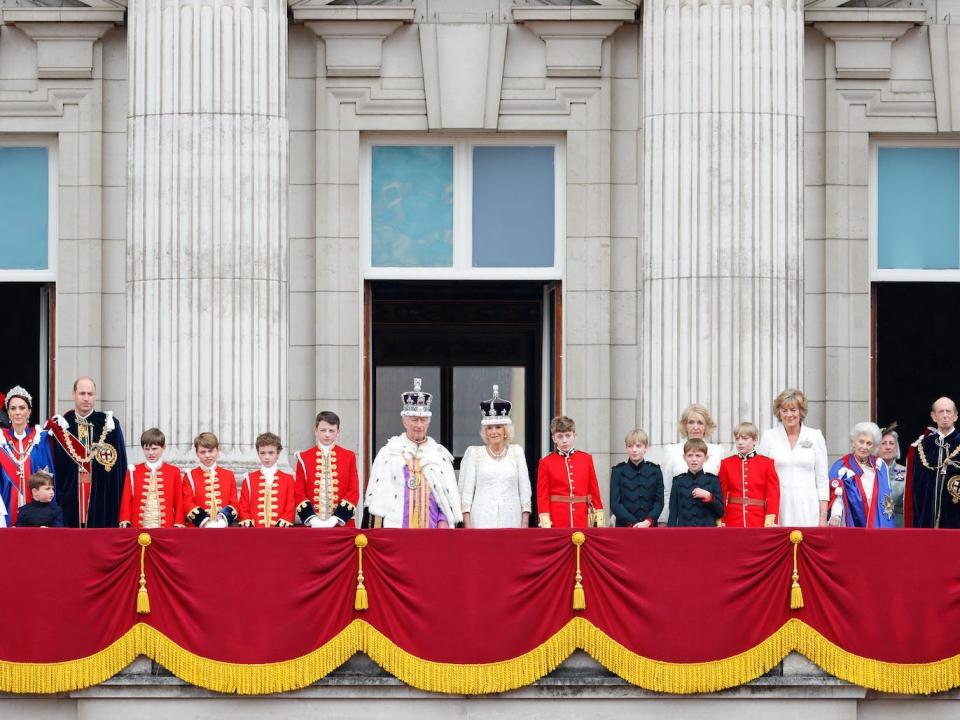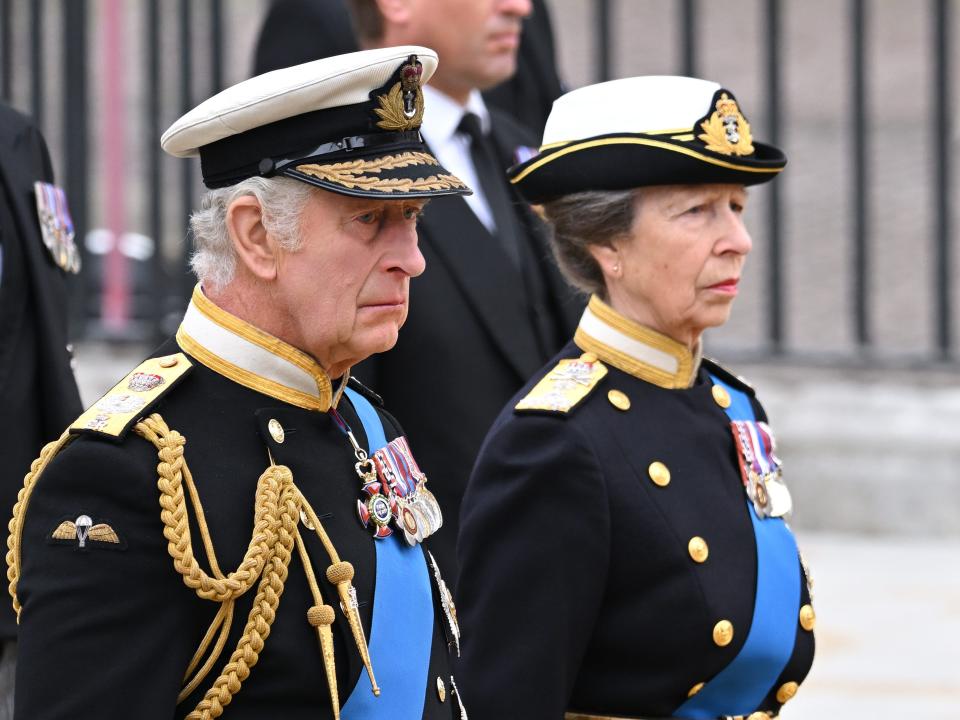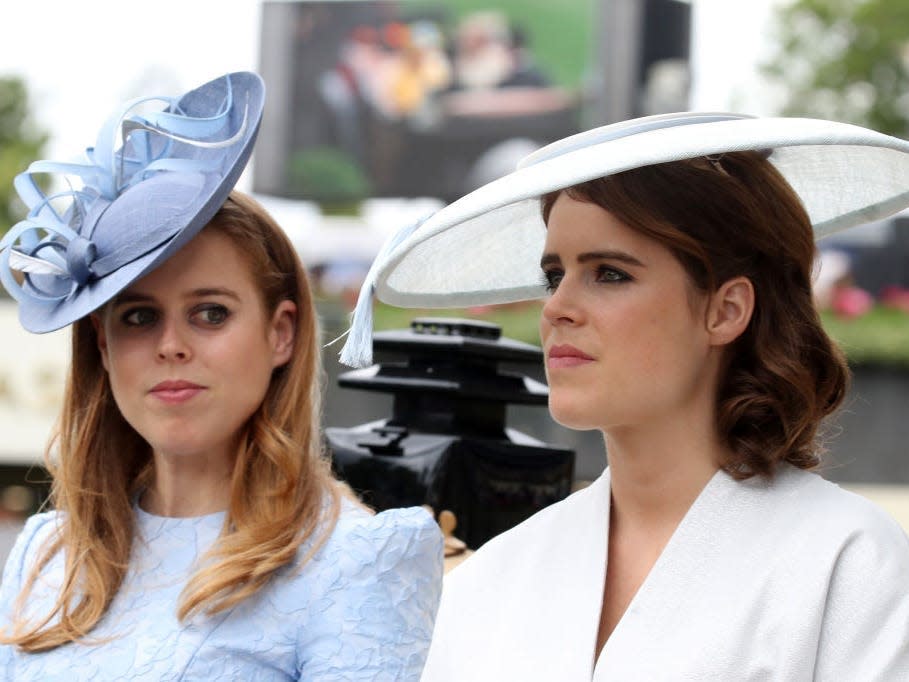The British monarchy has never been more vulnerable to destruction
The future of the monarchy has been called into question amid King Charles' cancer diagnosis.
Royal biographer Phil Dampier told BI the monarchy is at risk of "collapse."
The royal family is too small and most of its key players are nearing retirement age.
King Charles' cancer diagnosis marks a dangerous new era for the British monarchy, which is running out of key players.
Buckingham Palace announced on Monday that the British monarch, 75, had been diagnosed with cancer while undergoing treatment for an enlarged prostate.
The palace didn't disclose which form of cancer the king has but noted he would step back from public duties while receiving treatment.
The situation highlights how small the royal circle has become — making it vulnerable to collapse, according to royal experts who spoke to Business Insider.
Buckingham Palace did not respond to a request for comment on the matter.
Charles' monarchy is too small and too old
The palace said the king will continue undertaking state business and official paperwork while receiving treatment. His public appearances will be temporarily paused, and other members of the family such as Prince William and the king's sister, Princess Anne, will be expected to step up.
The situation sheds light on two key issues that could damage the monarchy's future: It's far too small, and it's missing young blood.

Before he took the throne, it was widely reported that Charles planned to create a "slimmed down" monarchy to reduce the number of royals funded by British taxpayers.
Royal biographer Phil Dampier told BI that the monarchy has unintentionally become "too slim" following the resignations of Prince Andrew in 2019 and the Duke and Duchess of Sussex in 2020. And more recently, Kate Middleton's abdominal surgery in January means she won't perform public duties for several weeks while recovering.
Princess Anne agrees with Dampier's sentiment. Speaking to CBC News in 2023, she said a slimmed-down monarchy "doesn't sound like a good idea" considering there are fewer royals around.

Dampier said the monarchy "could, with the wrong unforeseen circumstances, collapse quite quickly," if something were to happen to both the king and Prince William, who is heir to the throne.
"It could lose a lot of power and ability to operate if god forbid, some other disaster happened," he said.
Prince George, 10, is second in line to the throne — but he won't be eligible to undertake royal duties until he's at least 18. If George ascended the throne before then, a working royal would be assigned as a regent to undertake duties on his behalf. But it's unclear who would be chosen in that scenario.

At the time of writing, only 10 working royals remain, and most are nearing retirement age. Charles became the oldest person to be crowned king at the age of 73 in 2022. Queen Camilla and Anne are both in their seventies, while Prince Edward and his wife Sophie will turn 60 this year.
Abdication would be a 'personal tragedy,' experts say
Charles' future role has been called into question amid news of his diagnosis. But despite recent speculation, royal commentators Richard Fitzwilliams, Victoria Howard, and Marlene Koenig told BI that it's unlikely Charles would abdicate as it's not traditional for British monarchs to do so.
Abdication has become the norm in the Netherlands and Spain, and more recently, Denmark's Queen Margrethe announced her resignation in January. But in the UK, monarchs look at the job as "a life-long role," Howard, founder of The Crown Chronicles, told BI.

"While he may need to take a less central role, and his family step up to support with the business of his day-to-day activities, he will still seek to run the show and guide how things work," she said.
Fitzwilliams said abdication would only be considered in extreme circumstances, adding that it would be a "personal tragedy" for the king.
Koenig, a royal historian, pointed out that The 1937 Regency Act could be triggered if Charles becomes too ill to perform his duties, allowing William to take over without the need for abdication. As UCL's Constitution Unit states, William would require permission from the monarch's spouse and government officials, including the Lord Chancellor, Lord Chief Justice, Master of the Rolls, and Speaker of the House of Commons.
Royal recruitment could provide a solution
Whether Charles abdicates or not, the issue of size remains. There's power in numbers, and the royal family's lacking numbers inevitably puts it at risk.
Koenig said the king should consider recruiting younger non-working royals to join the ranks and support William as his role evolves.
"Should we have a worse-case scenario and William becomes King, there will be a need to include more people to take on some engagements," she said.
Koenig said that while Prince Andrew's daughters, Princess Beatrice, 35, and Princess Eugenie, 33, are private citizens, they could step in and undertake royal duties if Charles or William asked.

Royal commentator Kristen Meinzer agrees with Koenig. In an interview with BI's Samantha Grindell, she said Beatrice and Eugenie would bring a "youthful energy," to engagements.
For now, Charles' future is murky — and the monarchy's future is even murkier. It needs to expand in order to survive and stay relevant, but whether that will happen in practice is another story.
"As much as Buckingham Palace try to play things down, I've been reporting on the royals for 37 years — and you can't predict anything," Dampier said.
Read the original article on Business Insider

 Yahoo News
Yahoo News 
